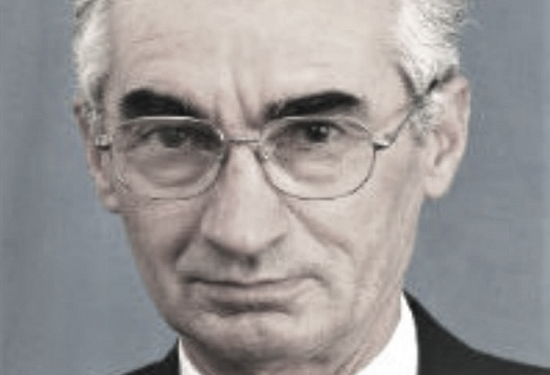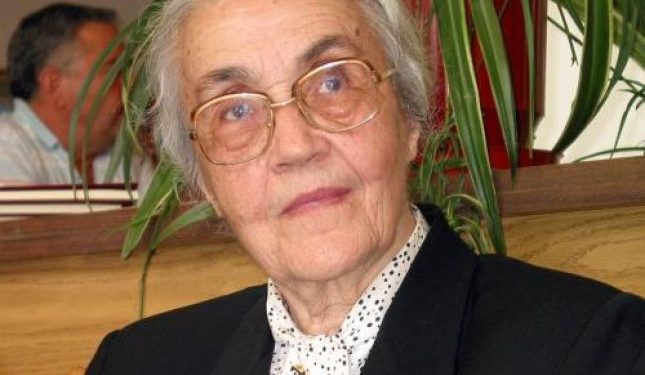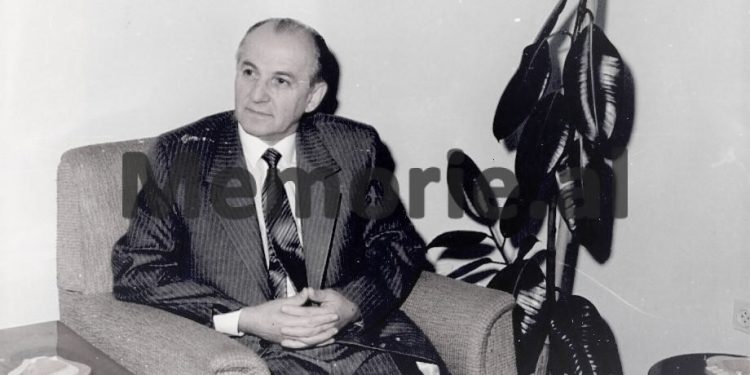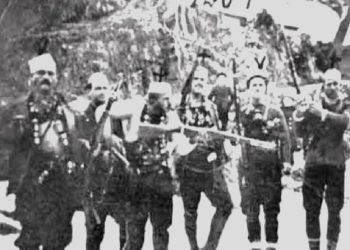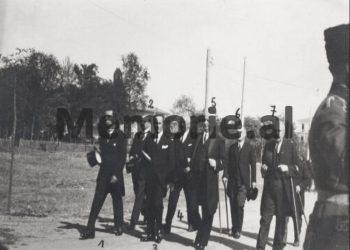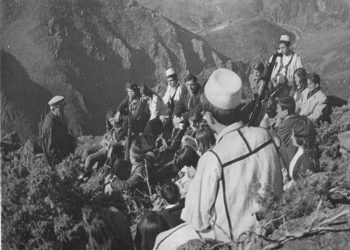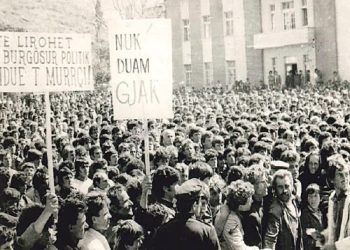By Eugene Merlika
– THE BIG FRAUD –
(Fake democracy and pink communism)
“Albania will be enjoyed by us and our children”
Ramiz Alia
Memorie.al/ “Our system has capitulated in front of that capitalist one, so we are forced to change strategy”! With this sincere statement that contradicted the half-century-old dogma of the “superiority of socialism”, as a social, political and economic order, the President of the State and of the Party of Albanian Communists, Ramiz Alia, in October 1989, began his speech before the Bureau Political. He was aware that that word would be a bridge between two historical times, that of socialism and another that would follow, with all its unknowns and that would be, in his aim and the red caste he presided over, a pink capitalism.
The year 1989, of the unimaginable wonders of a century of cruel wars and unparalleled dictatorships, was fast approaching its end. He had brought the breeze of freedom to the Eastern European countries that, one after the other, overthrew the communist regimes that had ruled them for almost half a century. The Berlin Wall had fallen and the “Iron Curtain” between the two parts of the continent remained, only a relic of a historical period that, surprisingly, had reached its last station.
In Albania, the epochal changes of the socialist camp were followed by a general silence, under which lukewarm hopes were lit and over which the sharp weapon of the red dictatorship, the State Security, watched like a hawk. The Ramiz-Nexhmije couple, who until then had been lulled into the tale of the eternity of Enverism without Enver, secretly projected a future that would provide them and their dependents, a comfortable and trouble-free old age, and their children a peaceful rule, no longer in a system of terror as the red dictatorship had been, but in a “capitalist democracy”, in the color and form that the “friends of the West” would advise you.
This was the essence of Ramiz Ali’s speech to the Political Bureau in October 1989. Archived as “highly secret”, for years this document, one of the most important in the history of the contemporary Albanian State, has been in the hands for several years of Albanians who, through him, have the opportunity to understand and explain all the “enigmas” of the transition period from one system to another. As such it is worth studying and commenting in detail. The word is a clear and detailed presentation of a large project, which would begin its construction soon and would extend over a long period of time.
According to former President Alia, the inevitable change would be limited to two points: “Respecting human rights and political pluralism”. They were the issues that Western Europe insisted on in its documents and which, the economic failure of the socialist system, had made it mandatory to be swallowed by its hierarchs. The experiences of these years showed how these two basic principles would be sufficient to build a true democracy, but the cunning Alia also warned, when he submitted:
“Human rights are something within us and they can be abused to some extent, but pluralism will become that it does not. We will encourage our opponents to create as many parties as they want; left, right and center, but still these parties must be controlled and directed by us. We will formulate and approve the programs for the establishment of these parties. At the head of these parties, people must be appointed to support our strategy”!
Were the orders of Ramiz Ali implemented in the creation of the parties, or did they arise spontaneously from the suppressed desire for ten years in a row? Was it a coincidence that former cadres of the regime, even from the secret services, were put at the head of the parties, or did they has the courage that the persecuted of the dictatorship lacked? Was the creation of dozens of parties in Albanian life simply a passion for politics, a way to make a living or part of a strategy to fragment the opposition to the “reformed” communist party? These and other questions like these still torment the ordinary Albanian who cannot understand who are served by dozens of groups of people, called parties, when the pace of development of the country does not even compare with our neighbors and the standard of living knows a dizzying climb only for the ruling castes and for traffickers and lawbreakers.
Everyone remembers the times of enthusiasm for the creation of parties, starting with the Democratic one. Their leaders, who quickly threw the red flag in the bin and declared themselves champions of democracy and anti-communism, spoke with passion and passion against Enver Hoxha, about the regime’s crimes, the lack of freedom, etc. It was noticeable that in these parties, there were few or no former prisoners of conscience or representatives of the anti-communist diaspora. This was due to some extent to their timidity and the thought that the indoctrinated people would not understand their participation in political life, sometimes openly and sometimes in a disguised way, and the non-acceptance of the new leaders. The latter who thought, like their journeyman, that they needed the “moral card” of the convicts of the dictatorship, competed in demagoguery to win their support.
The Democratic Party was the one that took in more ex-persecuted people. In the first years, some of them were given positions of party and state importance, at different levels. But the activation of the former political persecutors was only one side of the indicator of the democratic tendencies of these parties. The other side and the most important were the economic strategy and the reforms that should change the system.
The essence of these reforms was the recognition and return of property, i.e. a redistribution of state property among the citizens, who were forcibly robbed by the Communist State almost half a century ago. The attitude of the parties was a general revolt, summed up in the communist expression: “We will not allow the Beylers and rich to return to us”. Law 7501, which was approved almost unanimously by the Assembly, as a result of an agreement between the democrats and the socialists, was the foundation of the entire post-communist backlash. That law gave the land to use without much change from the Agrarian Reform of 1946, without the intention of forcibly reuniting the peasants, but also without taking into account whose land it had been.
With a cosmetic intervention only for appearance, the idea was created that the State was being stripped of its economic power, and that the people were given the opportunity to restore their own property. The peasants returned to the cotter of the land, which was not theirs, but for a certain time they would not pay the obligations arising from its use. It was no coincidence that the people in some areas of the country, especially in the North-East, did not accept this law and decided unanimously to return everyone’s ownership to the borders before the Agrarian Reform. The communist caste, which was aware that political power had to be temporarily released, in order to “democratically” own the economic one, had drafted it with the aim, then established, to preserve the possibility of its enrichment, in a legal and , more illegal.
The lack of ownership determination deprived the country of the foreign investment lots that, in the early 90s, were almost equal for all Eastern Countries, leading to the Greek calendars, the times of putting it on the road to economic development. This enormous damage that was caused to the country, the serious consequences of which we continue to pay every day, was the result of the incompetence and the dilettantism of the post-communist ruling class that could not understand the advantages of the moment, or the implementation of a strategy default? We find the simple answer in the words of Ramiz Ali: “We, the “Reformer Communists”, will implement our strategy in the economy, according to which the future capitalists and owners in a socialist country will be us and our people. With this strategy, within two or three legislatures, we will manage to create the capitalist class from the communist classes, which will perpetuate us in the political power of the future that we have planned and are preparing ourselves….”!
In implementation of this strategy, we were present at the beginning of the 90s, in the annihilating attack of vandalism on economic, social-cultural, trade facilities, on means of transport, even on fruit and non-fruit trees, in robberies of warehouses and shops. This type of banditry, covered with the veil of “hatred for communism”, orchestrated by an invisible network of former security guards and members of the Labor Party, aimed to possess through robbery, the wealth that was left in the State warehouses, but and to turn, apparently, into worthless things, state facilities. No one, starting from the irresponsible Government of “destabilization”, of Ylli Bufi, was concerned about the great damage caused to the country’s image by this strategy of destruction, in one of the most decisive moments, for its future.
The looted goods would serve as a basis to start the path of enrichment, while the devaluing of the objects would result in their purchase, almost for free, in the privatization process that would begin soon. The latter would be done with clearly favorable criteria for the communists who, according to the old principle: “politics in the foreground”, had all the key positions in the various sectors of the economy and trade. The State of the Democratic Party would give priority in the purchase of buildings to those who worked in them. At first sight, it was something right, in fact it was the implementation of the strategy of creating the “capitalist class” by the communists. In this direction, the privatization commissions would give their help, which, not only for class selection but also for personal gain, would apply prices completely to the benefit of the buyers. The connections with the illegal profit environments in the neighboring and Western countries, especially in Italy, would give rise to the birth of various traffics that brought staggering wealth, in a relatively short time.
This was the medium-term strategy of the communists but, for the moment, it had to be kept only as a secret and undeclared goal. For the moment, the facade had to be polished, the credibility of the West had to be gained, which had to approve the path taken, to open the era of reconciliation and leaving conflicts behind. For this, a new attitude was needed against all those who, until yesterday, had been the “sworn enemies” of socialism, inside and outside Albania. The wolves would wear the skins of lambs and, cursing the chief wolf as much as they could, would create the illusion for the victims that their time had already come. The Ramizian strategy foresaw a significant improvement in the living conditions of that part of the population, which had been subjected to the Enverist ordeal in the diabolical variety of prisons, labor camps, and those of exile for ten years in a row.
The strategy was as cunning as it was sneaky. In order to be convincing in its “goal”, it was necessary to trust not the former ministers of Adil Çarçan, the journalists of the “Voice of the People” or the researchers of the Institute headed by Nexhmije Hoxha, but the new political class, consisting of professionals of all fields and, any former political prisoner. Chairman Alia projects, as if on a screen, the expected events and the possibilities of channeling them, as according to certain interests of the plan studied to its details.
“The party that will take power will revile communism to the core and to the roof. In this way we will win the sympathy of the West and the Anti-Communist Dissidence. Those who are in prisons, the convicts and the persecuted political anti-communists, will talk about us and insult us. And these people are known to hate communism, but they will approach us and support us. We care about their moral card. We will approach them and give them trivial work; but we will never let them take our power, because as soon as they get the power, they will start to take revenge and we would thus become their followers.
In the implementation of human rights, we must also give them monetary compensation; provide political prisoners with housing comforts…”!
The limits within which the demagogy of the new style will revolve are thus clearly defined, in order to reach the essential goal which remains the preservation of power from the danger of its fall to those who should have been its legitimate heirs in the conditions of collapse of the system. The script was executed with admirable fidelity, even the obligatory omissions were fewer than those anticipated.
Today, 15 years later, the former persecuted should raise a “memorial” to President Alia, because if his program had been established, perhaps they would all have had a house and would have benefited compensation money for unpaid sweat in the forced labor camps of Socialist Albania. His successors in power competed with each other as to who could deceive them more. The problem of their housing, which normally should have been solved in the framework of the redistribution of state real estate, still remains a puzzle today. With the money that the State asked as a reward, they cannot even buy a house for one person, while those who have been recognized as owners of seized houses, still continue to see the tenants “landlords”, who pay ridiculous rents, less than symbolic. Many others continue to go to trial for years, as the “magician Alia” had prophesied in October 1989:
“We will give the seized and the expropriated a letter in their hand to recognize their property, but we will never give them their property and we will confuse them with each other in different ways. They will go through the courts, where rotation will be implemented from the Court of First Instance to the second, etc. and for “technical defects” they will return to the first…”!
The dark tunnel of Justice, one of the unsolved problems of all these years. How many dramas and tragedies have been added to Albanians by the decisions of the courtrooms, how many injustices have been legislated in them? From the words of the post-communist director, it is clearly understood that Justice has been remote-controlled, that it has not served the creation and empowerment of the independent Institution. It has served as a measure, as the long hand of the Communist Party, to establish its goals, which remained the perpetuation of the robbery of Albanian citizens, started in 1945, and the appropriation of their wealth by “democratic” means. The many years of waiting at the doors of the courts, which have poisoned the lives of many people in these years, are not only a consequence of the moral emptiness of a part of the servants of the temple of Justice, but also part of the economic and power strategy of the Ramizian project.
The participation in political life of those who had never reconciled with communism was another aspect of the farce of deceptions suffered by that social stratum, about which there was so much talk in the first years of the so-called democracy. Maybe it would not have been talked about as much, if the communist leaders had had the insight to understand that the bad fate of the Albanians condemned by the dictatorship was of little or no interest to the “free world”. Of course, neither they nor the persecuted and crippled of the “Red Dictatorship” could know that their lives, spent in prison camps, did not constitute any concern for that world. They were put on the same level as others, and as such, they would not have any priority in the public and official opinions of the West, for the ordeal of suffering that communism had forced them to go through…!
Many who can say that that layer did not have people prepared to participate in the management of the State and that during the DP governance period some of them reached the highest positions in the state administration. This is partly true, but it should be noted that the entire post-communist political class, with the exception of a part of the socialists, was improvised and dilettante, since they could not have gained political experience from hospitals, factories or institutions educational institution where they had served. In this context, the tendency to narrow the possibility of the participation of former prisoners of conscience in political life was disguised but real.
The very law on the control of figures, drawn up and largely announced as a measure that would limit the participation of ex-communist officials in the Assembly, was actually directed at the selection of elements coming from the former “inverted classes”. These had to be loyal to the Democratic Party, or its leaders, otherwise, they were discarded as unsuitable, allegedly according to the documents in the hands of the Secret Service which were inherited from the communist State Security. One wonders how these documents could be processed when there was no possibility of appealing the Commission’s decisions.
The compensation of the former convicts of forced labor during the communist regime still remains a problem without a solution 13 years after its overthrow. The ruling Democratic Party recognized it as an obligation on the part of the State, but did little to put it on the path to a solution. It compensated a very small part in cash and the greater part; it was transferred to “securities”, which, in the overwhelming part, were returned without any value to their bearers. A small part of them was sold on the market at one-sixth of the value and went to enrich those who bought the privatized facilities, the rest was swallowed up by the ghost of the ‘Anglo-Adriatic’ and no one is able to say what it ended. The Socialist Party that replaced the Democratic Party, which was more “sincere”, in the act of fraud, according to its former officials with Mr. Fatos Nano at the head, recognized the rewards in the amount of ten times, from the value set by the Government of Mexico, for several years in prison, given by the Court of Tirana in the years 1993-’94.
These punishments were also forewarned in Ramiz Ali’s speech, such as: “small punishments, just for the face of the high communist nomenclature”. But when it comes to the multitude of years of others, on whose compensation the cripples of the prisons hang the hope of the last days of life, Nano and his colleagues use, their entire arsenal of lies and excuses for, procrastination infinitely solves the problem. “Specialists” like Shkëlqim Cani or the experts of the International Monetary Fund come to your aid in this low demagoguery, not to say criminal, in the cooperative silence of the representatives of European organizations or the diplomacy of the major Western allies…!
What a bitter disappointment, after half a century of past ordeal because, spiritually and morally, they had felt themselves members of the Western world! How far were their illusions of that world, from the general disregard with which they were served by it? Years ago, in a commission with American representatives that examined the requirements of candidates for studies in the higher military schools of the USA, the selection fell more on the children of the communists. To a question from an Albanian member: why were few children of former persecuted people accepted, the American president answered that: “They are full of filth and this fact represents danger”. Of course, this episode cannot be generalized, but it remains indicative of an unhelpful mindset, regarding those who always dreamed of another life. In their imagination, they had twinned this life with the Western world, its principles, values and institutions. Memore.al
March, 2004
The next issue follows




